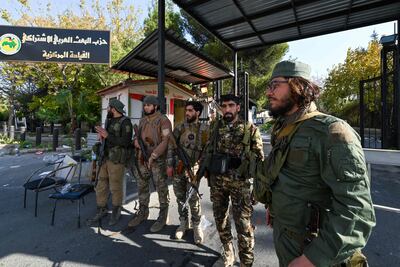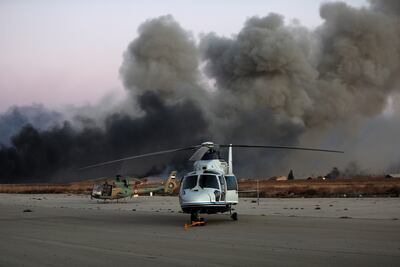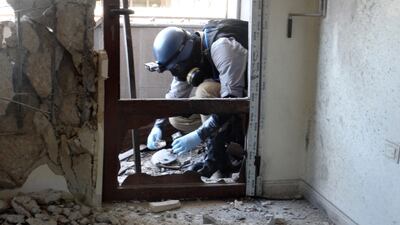Live updates: Follow the latest on Syria
A team of international chemical weapons experts should be sent to Syria “as soon as possible", a leading analyst on the weapons of mass destruction has said, amid fears ousted dictator Bashar Al Assad had secretly built up stockpiles.
On Monday, the Organisation for the Prohibition of Chemical Weapons (OPCW) said there remained "serious concerns" about "the fate of significant amounts of chemical weapons unaccounted for" and that "the Syrian declaration of its chemical weapons programme still cannot be considered as accurate and complete".
France and the US separately raised similar concerns on Saturday, as Hayat Tahrir Al Sham, a organisation formerly linked to Al Qaeda, and allied militant groups advanced towards the Syrian capital Damascus. Robert Wood, the US deputy ambassador to the UN, said Mr Al Assad's chemical weapons were "not a relic of the past".
Hamish de Bretton-Gordon, a leading expert on chemical weapons, on Monday told The National efforts to secure and destroy suspected toxic agents should not be delayed.
“We need to get the experts into Syria as soon as possible to verify destruction and to secure those which still exist,” said Mr de Bretton-Gordon, who led investigations into chemical weapons use in Syria and has advised the UK government on the toxins.
An OPCW statement said it was "closely monitoring" information about "the security and integrity of declared chemical weapons research, development, production, storage and testing sites".
Syria promised to give up its chemical weapons after international experts said the Assad regime had fired sarin nerve gas rockets into the Ghouta area near Damascus in August 2013, with estimates of the death toll ranging from about 300 to 1,700. The following month, Damascus agreed to join the Chemical Weapons Convention and to hand over its stockpiles for destruction under the supervision of the OPCW.
Sarin, a liquid dispersed as vapour, kills by disrupting the nervous system, causing fatal seizures and an agonising death. It has been used by terrorists before, in 1995, when an extremist cult dropped a small amount on the Tokyo subway in 1995, killing 13 people and injuring 1,000, but scientists say it is difficult to weaponise without significant expertise.
Experts say Syria has used chemical weapons throughout the civil war that began in 2011 – more than 300 times by some counts, including nine suspected attacks – after agreeing to destroy them. Syria was previously accused of having VX, the world’s most lethal nerve agent, after inspectors found traces of the chemical at a site that had not been declared. VX is 100 times deadlier than sarin and can kill with a tiny amount on the skin.
The OPCW has repeatedly expressed concerns that Syria retained significant quantities of chemical weapons, or continued research on them covertly. On Friday, two days before Mr Al Assad fled Damascus, it said there were “outstanding issues related to potentially undeclared full-scale development and production of chemical weapons at two declared chemical weapons-related facilities, which were previously declared as having never been in operation".
In a previous report in June, the watchdog warned of “undeclared research; the production or weaponisation of unknown quantities of chemical weapons; and significant quantities of chemical-warfare agents, precursors or chemical munitions whose fate has not yet been fully verified by the OPCW”.
Israel’s Foreign Minister Gideon Sa’ar at the weekend said its military had carried out strikes on suspected chemical weapons sites in Syria. “We attacked strategic weapons systems, for example, remaining chemical weapons ... in order that they will not fall in the hands of extremists,” he said.
Burning chemical weapons
It is not yet clear whether such strikes – on Khalkhakah Airbase and a scientific research centre in Damascus so far – might affect nearby populations if the targets were indeed chemical weapons sites. Israeli special forces, according to multiple accounts, raided Masyaf in September, one of the regime’s critical weapon research sites, in an apparent attempt to destroy underground infrastructure.
“The best way to get rid of them is for an OPCW team to go in and remove them to be destroyed elsewhere but if that is not possible, blowing them up is viable to destroy them, " Mr de-Bretton Gordon said.
“There is a danger of spreading contamination but [it is] fairly small, especially if there are large explosions and fires. Fires will incinerate the chemical weapon, which is how we would destroy them anyway.”
Syria’s deadliest chemical weapons are what experts refer to as “binary”, meaning their constituent parts are stored separately and usually mixed as the weapon is in flight. This is because nerve agents such as sarin last only weeks or months when prepared for use – after that they can become corrosive, difficult to store and lose potency.
“If there's binary components to sarin, one of them is extremely flammable. Biggest risk, to me, is loss of information to be exploited from the sites,” says Dan Kaszeta, an expert on chemical weapon proliferation who has worked with the US government.
“Bear in mind, we're at a point where Israel can say ‘oh, look a CW site’ and bomb anything. So we have to exercise a bit of rigour on these claims.”
If Israel has struck ready-to-use nerve agents, the risk to civilian populations could be much higher than if binary weapons are struck and burnt up. In 2022, scientists at the University of Texas completed decades of research into Gulf War Syndrome, a collection of symptoms in veterans from the 1991 Gulf War in Kuwait and Iraq.
About 100,000 US and British veterans reported “fatigue, persistent headaches, muscle pain, confusion and even difficulty speaking”, for years after the conflict. Robert Haley, one of the researchers into the syndrome, said his team believed coalition bombing of Saddam Hussein's sarin gas stockpiles had caused the mysterious illness, with minuscule amounts of vapour from the strikes travelling thousands of kilometres.
The specs
Price, base / as tested Dh100,000 (estimate)
Engine 2.4L four-cylinder
Gearbox Nine-speed automatic
Power 184bhp at 6,400rpm
Torque 237Nm at 3,900rpm
Fuel economy, combined 9.4L/100km
Teaching in coronavirus times
UAE currency: the story behind the money in your pockets
Company%C2%A0profile
%3Cp%3E%3Cstrong%3ECompany%20name%3A%20%3C%2Fstrong%3ELeap%0D%3Cbr%3E%3Cstrong%3EStarted%3A%20%3C%2Fstrong%3EMarch%202021%0D%3Cbr%3E%3Cstrong%3EFounders%3A%3C%2Fstrong%3E%20Ziad%20Toqan%20and%20Jamil%20Khammu%0D%3Cbr%3E%3Cstrong%3EBased%3A%3C%2Fstrong%3E%20Dubai%0D%3Cbr%3E%3Cstrong%3ESector%3A%20%3C%2Fstrong%3EFinTech%0D%3Cbr%3E%3Cstrong%3EInvestment%20stage%3A%20%3C%2Fstrong%3EPre-seed%0D%3Cbr%3E%3Cstrong%3EFunds%20raised%3A%3C%2Fstrong%3E%20Undisclosed%0D%3Cbr%3E%3Cstrong%3ECurrent%20number%20of%20staff%3A%20%3C%2Fstrong%3ESeven%3C%2Fp%3E%0A
Explainer: Tanween Design Programme
Non-profit arts studio Tashkeel launched this annual initiative with the intention of supporting budding designers in the UAE. This year, three talents were chosen from hundreds of applicants to be a part of the sixth creative development programme. These are architect Abdulla Al Mulla, interior designer Lana El Samman and graphic designer Yara Habib.
The trio have been guided by experts from the industry over the course of nine months, as they developed their own products that merge their unique styles with traditional elements of Emirati design. This includes laboratory sessions, experimental and collaborative practice, investigation of new business models and evaluation.
It is led by British contemporary design project specialist Helen Voce and mentor Kevin Badni, and offers participants access to experts from across the world, including the likes of UK designer Gareth Neal and multidisciplinary designer and entrepreneur, Sheikh Salem Al Qassimi.
The final pieces are being revealed in a worldwide limited-edition release on the first day of Downtown Designs at Dubai Design Week 2019. Tashkeel will be at stand E31 at the exhibition.
Lisa Ball-Lechgar, deputy director of Tashkeel, said: “The diversity and calibre of the applicants this year … is reflective of the dynamic change that the UAE art and design industry is witnessing, with young creators resolute in making their bold design ideas a reality.”
The five pillars of Islam
Afro%20salons
%3Cp%3E%3Cstrong%3EFor%20women%3A%3C%2Fstrong%3E%3Cbr%3ESisu%20Hair%20Salon%2C%20Jumeirah%201%2C%20Dubai%3Cbr%3EBoho%20Salon%2C%20Al%20Barsha%20South%2C%20Dubai%3Cbr%3EMoonlight%2C%20Al%20Falah%20Street%2C%20Abu%20Dhabi%3Cbr%3E%3Cstrong%3EFor%20men%3A%3C%2Fstrong%3E%3Cbr%3EMK%20Barbershop%2C%20Dar%20Al%20Wasl%20Mall%2C%20Dubai%3Cbr%3ERegency%20Saloon%2C%20Al%20Zahiyah%2C%20Abu%20Dhabi%3Cbr%3EUptown%20Barbershop%2C%20Al%20Nasseriya%2C%20Sharjah%3C%2Fp%3E%0A
AWARDS
%3Cp%3E%3Cstrong%3EBest%20Male%20black%20belt%3A%20%3C%2Fstrong%3ELucas%20Protasio%20(BRA)%3Cbr%3E%3Cstrong%3EBest%20female%20black%20belt%3A%20%3C%2Fstrong%3EJulia%20Alves%20(BRA)%3Cbr%3E%3Cstrong%3EBest%20Masters%20black%20belt%3A%3C%2Fstrong%3E%20Igor%20Silva%20(BRA)%3Cbr%3E%3Cstrong%3EBest%20Asian%20Jiu-Jitsu%20Federation%3A%3C%2Fstrong%3E%20Kazakhstan%3Cbr%3E%3Cstrong%3EBest%20Academy%20in%20UAE%3A%20%3C%2Fstrong%3ECommando%20Group%2C%20Abu%20Dhabi%3Cbr%3E%3Cstrong%3EBest%20International%20Academy%3A%3C%2Fstrong%3E%20Commando%20Group%2C%20Abu%20Dhabi%3Cbr%3E%3Cstrong%3EAfrican%20Player%20of%20the%20Year%3A%20%3C%2Fstrong%3EKatiuscia%20Yasmira%20Dias%20(GNB)%3Cbr%3E%3Cstrong%3EOceanian%20Player%20of%20the%20Year%3A%20%3C%2Fstrong%3EAnton%20Minenko%20(AUS)%3Cbr%3E%3Cstrong%3EEuropean%20Player%20of%20the%20Year%3A%3C%2Fstrong%3E%20Rose%20El%20Sharouni%20(NED)%3Cbr%3E%3Cstrong%3ENorth%20and%20Central%20American%20Player%20of%20the%20Year%3A%20%3C%2Fstrong%3EAlexa%20Yanes%20(USA)%3Cbr%3E%3Cstrong%3EAsian%20Player%20of%20the%20Year%3A%20%3C%2Fstrong%3EZayed%20Al%20Katheeri%20(UAE)%3Cbr%3E%3Cstrong%3ERookie%20of%20the%20Year%3A%3C%2Fstrong%3E%20Rui%20Neto%20(BRA)Rui%20Neto%20(BRA)%3C%2Fp%3E%0A
More on animal trafficking
New UK refugee system
- A new “core protection” for refugees moving from permanent to a more basic, temporary protection
- Shortened leave to remain - refugees will receive 30 months instead of five years
- A longer path to settlement with no indefinite settled status until a refugee has spent 20 years in Britain
- To encourage refugees to integrate the government will encourage them to out of the core protection route wherever possible.
- Under core protection there will be no automatic right to family reunion
- Refugees will have a reduced right to public funds
Mobile phone packages comparison
Two products to make at home
Toilet cleaner
1 cup baking soda
1 cup castile soap
10-20 drops of lemon essential oil (or another oil of your choice)
Method:
1. Mix the baking soda and castile soap until you get a nice consistency.
2. Add the essential oil to the mix.
Air Freshener
100ml water
5 drops of the essential oil of your choice (note: lavender is a nice one for this)
Method:
1. Add water and oil to spray bottle to store.
2. Shake well before use.
More from Rashmee Roshan Lall
SPEC%20SHEET%3A%20NOTHING%20PHONE%20(2)
%3Cp%3E%3Cstrong%3EDisplay%3A%3C%2Fstrong%3E%206.7%E2%80%9D%20LPTO%20Amoled%2C%202412%20x%201080%2C%20394ppi%2C%20HDR10%2B%2C%20Corning%20Gorilla%20Glass%3C%2Fp%3E%0A%3Cp%3E%3Cstrong%3EProcessor%3A%3C%2Fstrong%3E%20Qualcomm%20Snapdragon%208%2B%20Gen%202%2C%20octa-core%3B%20Adreno%20730%20GPU%3C%2Fp%3E%0A%3Cp%3E%3Cstrong%3EMemory%3A%3C%2Fstrong%3E%208%2F12GB%3C%2Fp%3E%0A%3Cp%3E%3Cstrong%3ECapacity%3A%3C%2Fstrong%3E%20128%2F256%2F512GB%3C%2Fp%3E%0A%3Cp%3E%3Cstrong%3EPlatform%3A%3C%2Fstrong%3E%20Android%2013%2C%20Nothing%20OS%202%3C%2Fp%3E%0A%3Cp%3E%3Cstrong%3EMain%20camera%3A%3C%2Fstrong%3E%20Dual%2050MP%20wide%2C%20f%2F1.9%20%2B%2050MP%20ultrawide%2C%20f%2F2.2%3B%20OIS%2C%20auto-focus%3C%2Fp%3E%0A%3Cp%3E%3Cstrong%3EMain%20camera%20video%3A%3C%2Fstrong%3E%204K%20%40%2030%2F60fps%2C%201080p%20%40%2030%2F60fps%3B%20live%20HDR%2C%20OIS%3C%2Fp%3E%0A%3Cp%3E%3Cstrong%3EFront%20camera%3A%3C%2Fstrong%3E%2032MP%20wide%2C%20f%2F2.5%2C%20HDR%3C%2Fp%3E%0A%3Cp%3E%3Cstrong%3EFront%20camera%20video%3A%3C%2Fstrong%3E%20Full-HD%20%40%2030fps%3C%2Fp%3E%0A%3Cp%3E%3Cstrong%3EBattery%3A%3C%2Fstrong%3E%204700mAh%3B%20full%20charge%20in%2055m%20w%2F%2045w%20charger%3B%20Qi%20wireless%2C%20dual%20charging%3C%2Fp%3E%0A%3Cp%3E%3Cstrong%3EConnectivity%3A%3C%2Fstrong%3E%20Wi-Fi%2C%20Bluetooth%205.3%2C%20NFC%20(Google%20Pay)%3C%2Fp%3E%0A%3Cp%3E%3Cstrong%3EBiometrics%3A%3C%2Fstrong%3E%20Fingerprint%2C%20face%20unlock%3C%2Fp%3E%0A%3Cp%3E%3Cstrong%3EI%2FO%3A%3C%2Fstrong%3E%20USB-C%3C%2Fp%3E%0A%3Cp%3E%3Cstrong%3EDurability%3A%3C%2Fstrong%3E%20IP54%2C%20limited%20protection%3C%2Fp%3E%0A%3Cp%3E%3Cstrong%3ECards%3A%3C%2Fstrong%3E%20Dual-nano%20SIM%3C%2Fp%3E%0A%3Cp%3E%3Cstrong%3EColours%3A%3C%2Fstrong%3E%20Dark%20grey%2C%20white%3C%2Fp%3E%0A%3Cp%3E%3Cstrong%3EIn%20the%20box%3A%3C%2Fstrong%3E%20Nothing%20Phone%20(2)%2C%20USB-C-to-USB-C%20cable%3C%2Fp%3E%0A%3Cp%3E%3Cstrong%3EPrice%20(UAE)%3A%3C%2Fstrong%3E%20Dh2%2C499%20(12GB%2F256GB)%20%2F%20Dh2%2C799%20(12GB%2F512GB)%3C%2Fp%3E%0A
MATCH SCHEDULE
Uefa Champions League semi-final, first leg
Tuesday, April 24 (10.45pm)
Liverpool v Roma
Wednesday, April 25
Bayern Munich v Real Madrid (10.45pm)
Europa League semi-final, first leg
Thursday, April 26
Arsenal v Atletico Madrid (11.05pm)
Marseille v Salzburg (11.05pm)
COMPANY PROFILE
Name: Qyubic
Started: October 2023
Founder: Namrata Raina
Based: Dubai
Sector: E-commerce
Current number of staff: 10
Investment stage: Pre-seed
Initial investment: Undisclosed
APPLE IPAD MINI (A17 PRO)
Display: 21cm Liquid Retina Display, 2266 x 1488, 326ppi, 500 nits
Chip: Apple A17 Pro, 6-core CPU, 5-core GPU, 16-core Neural Engine
Storage: 128/256/512GB
Main camera: 12MP wide, f/1.8, digital zoom up to 5x, Smart HDR 4
Front camera: 12MP ultra-wide, f/2.4, Smart HDR 4, full-HD @ 25/30/60fps
Biometrics: Touch ID, Face ID
Colours: Blue, purple, space grey, starlight
In the box: iPad mini, USB-C cable, 20W USB-C power adapter
Price: From Dh2,099
Killing of Qassem Suleimani
THE DETAILS
Kaala
Dir: Pa. Ranjith
Starring: Rajinikanth, Huma Qureshi, Easwari Rao, Nana Patekar
Rating: 1.5/5
BMW M5 specs
Engine: 4.4-litre twin-turbo V-8 petrol enging with additional electric motor
Power: 727hp
Torque: 1,000Nm
Transmission: 8-speed auto
Fuel consumption: 10.6L/100km
On sale: Now
Price: From Dh650,000
The specs
- Engine: 3.9-litre twin-turbo V8
- Power: 640hp
- Torque: 760nm
- On sale: 2026
- Price: Not announced yet
Pros%20and%20cons%20of%20BNPL
%3Cp%3E%3Cstrong%3EPros%3C%2Fstrong%3E%0D%3C%2Fp%3E%0A%3Cul%3E%0A%3Cli%3EEasy%20to%20use%20and%20require%20less%20rigorous%20credit%20checks%20than%20traditional%20credit%20options%0D%3C%2Fli%3E%0A%3Cli%3EOffers%20the%20ability%20to%20spread%20the%20cost%20of%20purchases%20over%20time%2C%20often%20interest-free%0D%3C%2Fli%3E%0A%3Cli%3EConvenient%20and%20can%20be%20integrated%20directly%20into%20the%20checkout%20process%2C%20useful%20for%20online%20shopping%0D%3C%2Fli%3E%0A%3Cli%3EHelps%20facilitate%20cash%20flow%20planning%20when%20used%20wisely%0D%3C%2Fli%3E%0A%3C%2Ful%3E%0A%3Cp%3E%3Cstrong%3ECons%3C%2Fstrong%3E%3C%2Fp%3E%0A%3Cul%3E%0A%3Cli%3EThe%20ease%20of%20making%20purchases%20can%20lead%20to%20overspending%20and%20accumulation%20of%20debt%0D%3C%2Fli%3E%0A%3Cli%3EMissing%20payments%20can%20result%20in%20hefty%20fees%20and%2C%20in%20some%20cases%2C%20high%20interest%20rates%20after%20an%20initial%20interest-free%20period%0D%3C%2Fli%3E%0A%3Cli%3EFailure%20to%20make%20payments%20can%20impact%20credit%20score%20negatively%0D%3C%2Fli%3E%0A%3Cli%3ERefunds%20can%20be%20complicated%20and%20delayed%0D%3C%2Fli%3E%0A%3C%2Ful%3E%0A%3Cp%3E%3Cem%3ECourtesy%3A%20Carol%20Glynn%3C%2Fem%3E%3C%2Fp%3E%0A
The%20specs
%3Cp%3E%3Cstrong%3EEngine%3A%3C%2Fstrong%3E%20Dual%20synchronous%20electric%20motors%0D%3Cbr%3E%3Cstrong%3EPower%3A%20%3C%2Fstrong%3E660hp%0D%3Cbr%3E%3Cstrong%3ETorque%3A%20%3C%2Fstrong%3E1%2C100Nm%0D%3Cbr%3E%3Cstrong%3ETransmission%3A%20%3C%2Fstrong%3ESingle-speed%20automatic%0D%3Cbr%3E%3Cstrong%3ETouring%20range%3A%20%3C%2Fstrong%3E488km-560km%0D%3Cbr%3E%3Cstrong%3EPrice%3A%20%3C%2Fstrong%3EFrom%20Dh850%2C000%20(estimate)%0D%3Cbr%3E%3Cstrong%3EOn%20sale%3A%20%3C%2Fstrong%3EOctober%3C%2Fp%3E%0A





